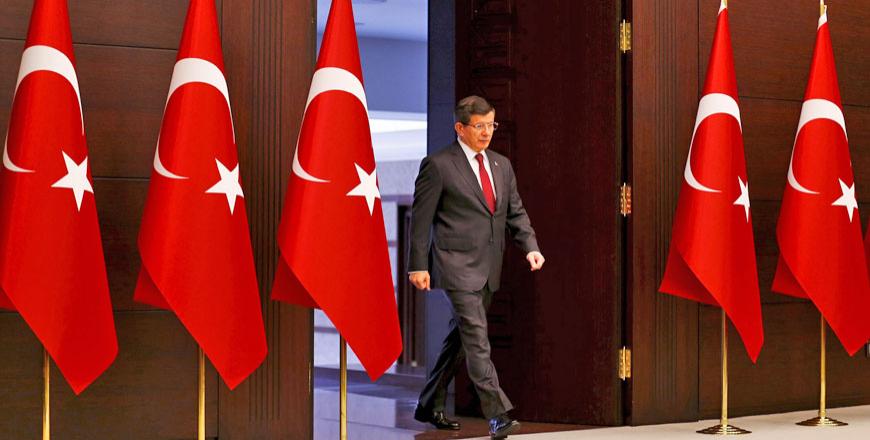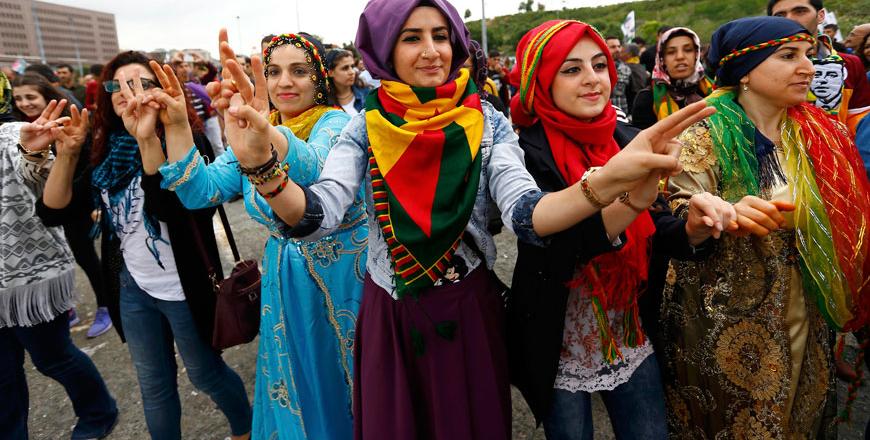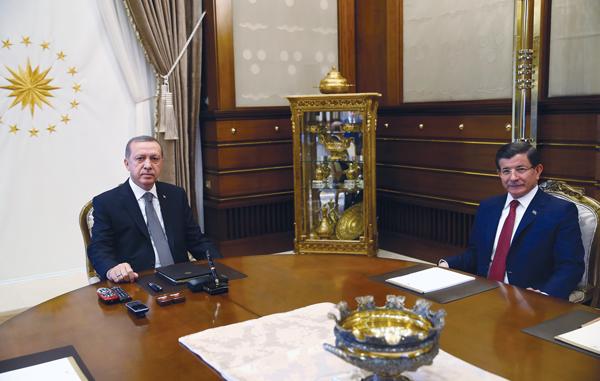You are here
Turkish prime minister makes last-ditch call for unity as government deadline looms
By Reuters - Aug 20,2015 - Last updated at Aug 20,2015

In this May 30 file photo, supporters of Turkey's President Recep Tayyip Erdogan sing and wave Turkish flags as they wait for their appearance in Istanbul during a rally to commemorate the anniversary of city's conquest by the Ottoman Turks (AP photo)
ANKARA — Prime Minister Ahmet Davutoglu made a last-ditch call for Turkey’s political parties to agree a working government on Thursday, three days before a deadline that would otherwise see President Recep Tayyip Erdogan call a snap election.
Davutoglu formally gave up efforts to find a junior coalition partner for his ruling AK Party on Tuesday, more than two months after it lost its overall majority for the first time since coming to power in 2002.
Turkey’s politicians have until August 23 to agree a working government or else Erdogan could call for an interim, power-sharing Cabinet to lead the country to a new election, which would be expected to be held in November.
That would prolong uncertainty which has sent the lira to a series of record lows. Investors have already been unnerved by rising violence in the mostly Kurdish southeast and by Turkey’s growing role in the conflict in neighbouring Syria.
In overnight trade, the currency briefly weakened below the psychological barrier of 3 to the dollar for the first time. It spent much of the trading day down more than 1 per cent before recovering losses.
“I am ready to sit down and talk any time, as long as we find a solution in parliament. The possibility of a coalition is no longer available so instead of blaming each other, let’s form a government,” Davutoglu told a news conference in Ankara.
“If that first option fails, and the president calls for a snap election, I urge all political parties to take part in this election government in line with the spirit of... the constitution,” he said.
An interim “election government” would see power shared between four political parties with deep ideological divides, a scenario likely to lead to stagnation in policy making. Forming such a Cabinet is in any case uncertain as two parties, the secularist Republican People’s Party (CHP) and the nationalist MHP, have said they would not take part.
Parliament could theoretically vote to back Davutoglu’s current caretaker cabinet staying in office for now, but opposition parties have little incentive to do so and either way an early election is all but inevitable.
In a note to political parties, the election commission proposed that any new election should be held on November 1, AKP officials said.
“Parties put forward their own views on the proposed date and after that an agreement will be sought. November 1 and November 22 are suitable for us,” one senior AKP official told Reuters.
Prolonged uncertainty
The prospect of another election has failed to assuage market worries about the $870 billion economy, not least because there is no guarantee that a re-run will produce anything other than another inconclusive outcome.
“A coalition would have been good for investor confidence, but now we have more uncertainty and I don’t think the result will change with new elections,” said Vedat Mizrahi, a managing director at financial services firm Unlu & Co.
“It is really tough right now. There is almost no foreign institutional investor interest in Turkey.”
The lira is now down over 20 per cent against the dollar this year, making it one of the worst performing currencies among its emerging market peers.
“We’re getting poorer by the day,” said elementary school teacher Nevin, 44, shopping for groceries at a supermarket in central Ankara. “Now they’re going to knock on our doors and ask for our votes? How dare they? Shameless politicians.”
Erdogan, who founded the Islamist-rooted AKP, could still in theory ask the main opposition CHP to try to form a government.
But the CHP has shown little sign of being able to assemble a majority, and Erdogan told a meeting of village administrators on Wednesday that he would not “waste time” with those who did not know the address of the presidential palace, an apparent reference to the head of the CHP.
The crisis has coincided with rising insecurity, as Turkey’s military jets pound Kurdish militant positions in southeastern Turkey and northern Iraq in response to attacks on the security forces, and as it opens its air bases for US-led coalition air strikes on Daesh insurgents in Syria.
Investors looking to the central bank for an independent steadying hand have, so far, been disappointed.
The bank declined to raise interest rates at its monthly policy meeting on Tuesday, in what investors saw as acquiescence to political pressure from Erdogan.
“The [central bank] is in ‘rabbit in the headlights’ mode again,” said Tim Ash, credit strategist at Nomura. “You have central bank independence for a reason — Turkey does not have enough of it these days.”
Some investors are starting to think, however, that the lira’s persistent slide could force an emergency rate hike.
“In the end they will have to hike even more aggressively to stop the bleeding in the lira,” said Unlu’s Mizrahi.
Related Articles
ANKARA — Prime Minister Ahmet Davutoglu invited high profile opposition figures to join an interim Cabinet on Wednesday, two months before a
ISTANBUL — Turkey on Monday entered a new period of political and financial turbulence after President Recep Tayyip Erdogan's ruling party l
ANKARA — Turkey's new Cabinet will bear the firm stamp of President Recep Tayyip Erdogan with a slew of loyal advisors set for ministe



















